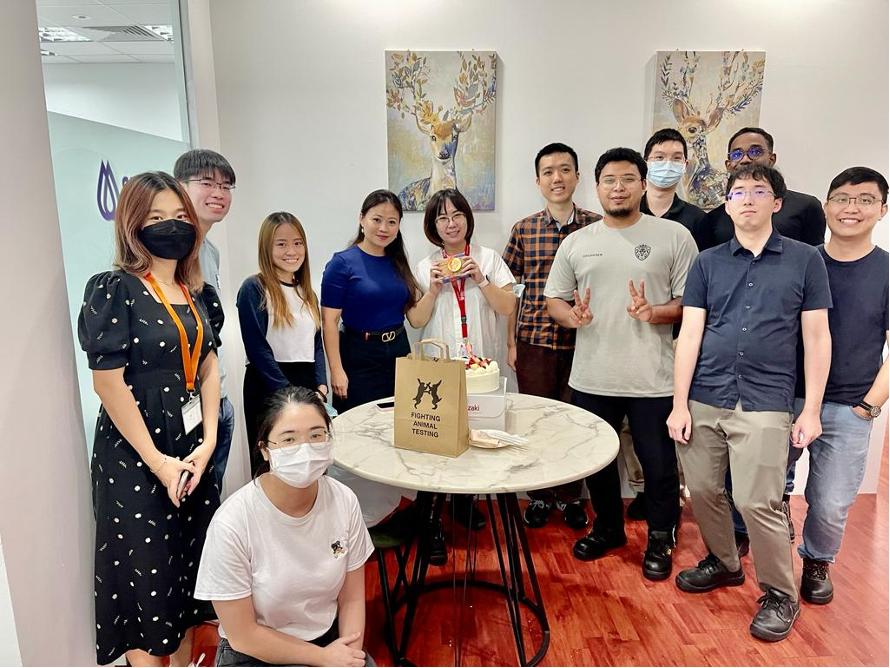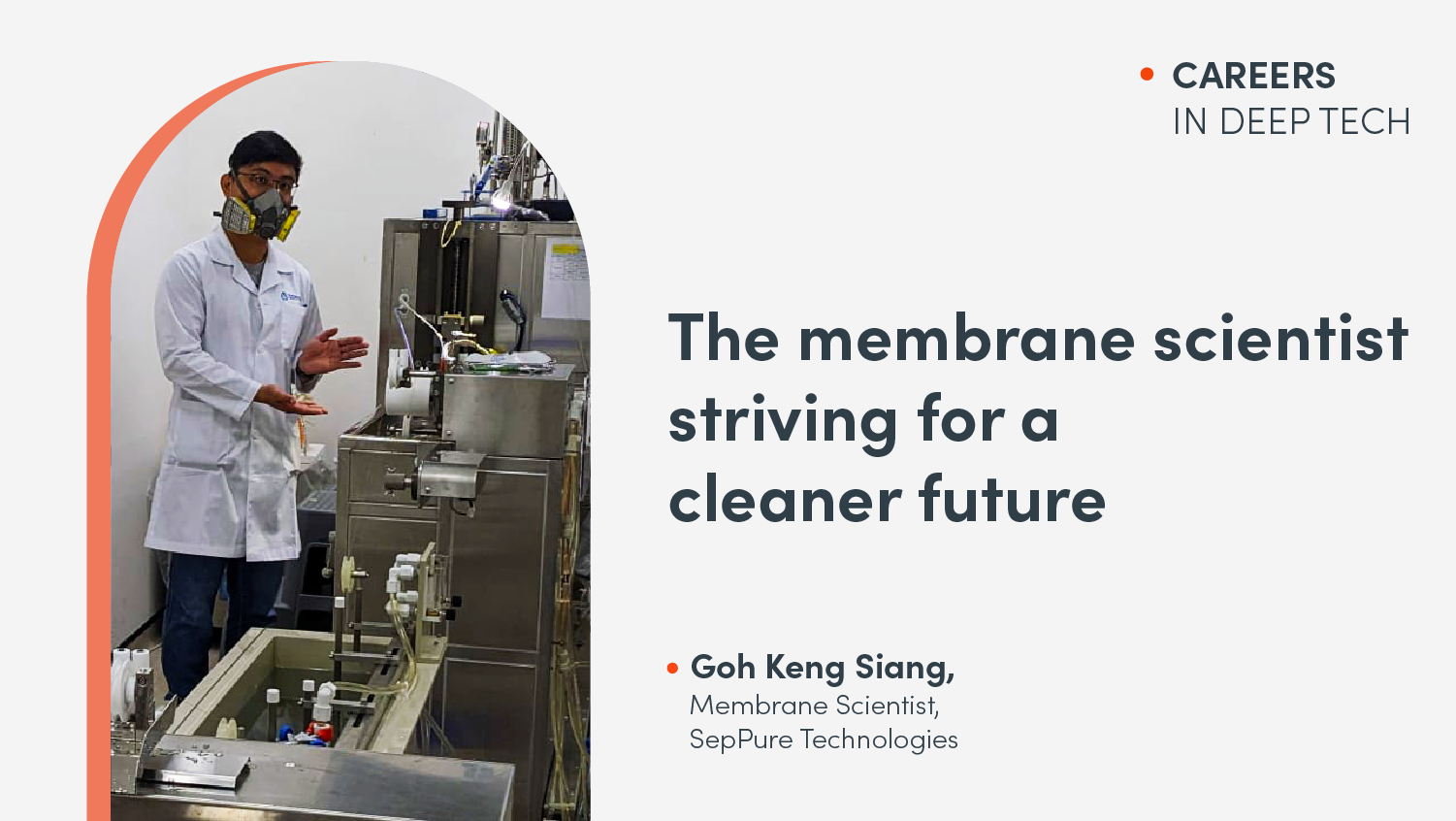The membrane scientist striving for a cleaner future
Wed, 04/12/2023 - 12:00
Dr Goh Keng Siang develops organic solvent nanofiltration (OSN) membranes, which reduce carbon emissions and energy costs in chemical separation and purification for products such as vegetable oils and medicine. He tells SGInnovate how his work at startup SepPure Technologies (SEPPURE), whose game-changing chemical filtration technology that does not require heat, helps promote sustainability.
What led you to what you do today?
I have a personal interest in the environment. I remember watching documentaries on National Geographic about dolphins and penguins when I was younger. It inspired me to protect the environment as I grew older. I try to keep my carbon footprint as low as possible and don’t waste food or buy electronics often. It’s not extreme but I do what I can.
Fuelled by this passion to save the earth, I pursued an undergraduate degree in environmental engineering at Nanyang Technological University (NTU), where I did research on membrane-based biofilm. My undergraduate professor then offered me a PhD project at NTU focusing on membranes and suggested OSN because it is a relatively new topic.
Over the course of my research, my interest in the topic continued to grow because I realised a lot of information on OSN has yet to be discovered. It is also environmentally friendly. The benefit of using membranes instead of other methods, such as distillation, lies in the amount of energy saved because a lot of energy is typically used in chemical separation.
After my PhD, I met my current CEO, Dr Mohammad H. D. A. Farahani, at a conference. Through our conversation, I realised this was what I wanted to do because there was more in this field I wanted to address.
Dr Goh in the “Spinning Room” with a machine that produces the membranes.
Could you tell us more about what you do at SEPPURE?
I’m a membrane scientist. Basically, I make membranes and modify them according to client specifications, such as the need to process polar or non-polar solvents, which dissolve in different compounds and require very different membrane characteristics.
A spinneret ‘spins’ polymer into hollow fibres which make up the membrane.
Membranes are made of polymers, which have to be dissolved in organic solvent and are mixed into a “dope”. Then, we pump it through a spinneret and collect the membrane, which is a process we call spinning, like spinning silk or a spiderweb.
After that comes modification and testing based on what the client wants. I also engage the business department and engineering team to ensure that any potential issues are solved as quickly as possible.
What challenges did you face in your research and its application?
The way we test and measure membrane performance is not standardised compared to water-based membranes because we don’t have the data. There's no such thing as a standardised protocol to test performance for OSN. So, I had to figure out solutions on my own and even develop my own performance metrics for testing.
Between the academic and commercial sides, there are also different standpoints. Academics focus more on novelty, while the commercial side is focused on the economics and scalability of membranes. Working with the rest of the group at SEPPURE, we have to make sure that the engineering team is happy with our membrane and that the business side is getting the data that they have promised the clients. But everyone has a common target, which is the commercialisation and scalability of membranes.
I feel like I can learn a lot in a startup. There’s no clear segregation between departments. So if we have issues or need data, we can just go over to the next room and ask – operations become smooth and efficient.
Why did you choose to work at a startup?
I feel like I can learn a lot in a startup. There’s no clear segregation between departments. So if we have issues or need data, we can just go over to the next room and ask – operations become smooth and efficient. For example, if you have an idea, you can pitch it to your boss and if the boss likes it then hey, why not try it?
The teams are also smaller, so you know everyone's strengths and weaknesses. Different people have different experiences and expertise, and you can just go over and ask them for their perspectives where it matters.

Dr Goh (extreme right) with the rest of the SEPPURE team.
More importantly, I believe in SEPPURE’S technology – a unique filtration process that uses chemically-resistant membranes that removed the use of heat from the entire process. I'm trying my best to make it more widely available in the market. I believe we are closing the loop in terms of recycling solvents, as well as some alternative ways to reduce energy consumption in general.
For example, to get vegetable oil, we take vegetables and squeeze out the oil. After the first round, 20 per cent of the oil is left as a sort of waste, so we use a solvent – hexane or acetone – to dissolve it. After that, we squeeze it again with the solvent to retrieve the remaining oil and then oil and solvent have to be separated. Most companies would do this through distillation. SEPPURE uses membranes instead, to separate the oil and recycle the solvent. Of course, the main benefit of using membranes is the lowered energy costs.
What is one important lesson you’ve learnt from SEPPURE?
Communication between teams is very important to make sure that everybody's on the same page. We are very open to ideas and criticisms across the board. Anybody can just come into my spinning lab and offer constructive feedback on how to improve. We take that positively because everybody just wants to make this work.
Learn more about how you can be a part of Singapore’s fast-growing Deep Tech sectors here.
Trending Posts
- From satellites to startups, Singapore’s space sector is pushing new frontiers
- How leaders should rethink cybersecurity strategy
- How to Future-Proof a Career in Deep Tech? Start here.
- The future of fusion energy: What will it take to bring the power of the stars to earth?
- Keeping satellites safe: How CYSAT Asia 2026 is tackling space cybersecurity






